By Lucy Komisar
Surreal, sometimes funny, often cruel, Rajiv Joseph’s play in a stunning production by Moisés Kaufman looks at killing, in war, and among beasts, and wonders if it is a primordial instinct, something that somehow infects people who think they don’t do that. It is a powerful production, not your typical war story, as the murder victims come back as ghosts.
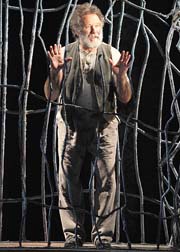
The place is Baghdad in 2003. Two U.S. marines are guarding the zoo. Behind them is a tiger (Robin Williams) who was caught 12 years before and is trapped inside the metal bars of a cage. The tiger – Williams – is barrel-chested, perhaps like our best vision of macho soldiers. He has plans of killing, like the soldiers. Williams is acerbically funny as a carnivore.
One of his counterparts is Kev (the excellent Brad Fleicher), a crude, hostile, violent, obnoxious soldier, so dumb he has trouble putting his gear on. The other is Kev’s partner Tom (Glenn Davis), who is compassionate and tries to feed the tiger, who promptly bites his hand off. Kev shoots the beast. A metaphor for the interaction between Americans and Iraqis?
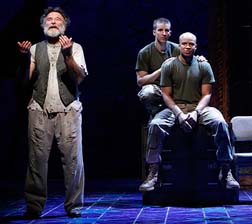
The tiger comes back as ghost. Kev sees him, though nobody else does. People see the ghosts of the people they killed. Another metaphor.
So how do the killers rationalize? The tiger declares that, Basic primordial instinct isn‘t cruel; it’s lunch. I’m guilty. That’s why I’m stuck here. (He needs to attack) And I caused untold misery to the parents of those children. But what could I do? I‘m a tiger.
Then he reconsiders: A basic primordial impulse isn‘t cruel! But, Holy fuck! What if it is? What if my every meal has been an act of cruelty? What if my very nature is in direct conflict with the moral code of the universe? That would make me a fairly damned individual. After all, lunch usually consists of the weak, the small, the stupid, the crippled. Because they‘re easier to kill.
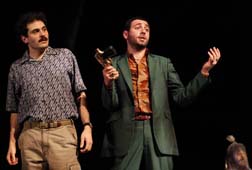
So, the tiger is our moral conscience, and the play is about war and repression exercised by the strong against the weak.
Saddam Hussein’s sons Udey (a malevolent Hrach Iitizian) and Cosey are examples of the predators. Udey is a ghost; Cosey is just a head in a bag. Joseph shows us their egregious violence. Musa (the very good Arian Moayed) is a frightened gardener, who makes topiary – a giant elephant, giraffe, horse, and eagle — in Uday’s palace garden. (The set is by Derek McLane.)
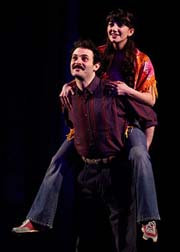
His sister Hadia (Sheila Vand) persuades him to show her the garden. Unfortunately for Hadia, the nasty Uday happens on the scene. I am Iraq, he declares.
He means that the terror is everywhere. Williams lumbers on, growling, telling everyone, This place is lousy with ghosts. The ghosts of the murdered. They‘re walking around, wide eyed… What happened to me? Where am I? You‘re dead and you‘re in Baghdad. Shut up. Expressing the cross-over horror, Kev prays in Arabic.
Joseph wonders how much the killer instinct has infected everyone. Musa gets into a fight over Uday’s gold pistol. Someone dies. Musa says, It wasn‘t supposed to happen. I didn‘t want to kill him. Uday replies, I know what you mean. Accidents like that are happening to Uday all the time. And Musa: I‘m not like you are…I am not the kind of person who does this. It is not who I am. But war is turning ordinary people into killers.
Is this a revelation of the human character? The tiger proclaims that All the great mysteries of creation could be revealed at the zoo. Come see the God exhibit! Come watch the beast play! And we, the lousy dead, would finally have our Holy Land…God in a cage in a burning city. Ohhh…. What a glorious sight!
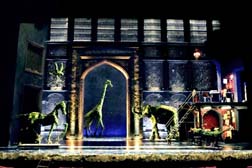
Director Kaufman makes the bizarre happenings seem real, as fantasy becomes figurative truth. In an oblique way, it’s a straightforward and important commentary on the war in Iraq and an aesthetically elegant and moving play.
Bengal Tiger at the Baghdad Zoo. Written by Rajiv Joseph; directed by Moisés Kaufman. 226 West 46th Street, New York, NY. Opened March 31, 2011. 212-307-4100; http://www.bengaltigeronbroadway.com/. Also on New York Theatre Wire.


Pingback: “Bengal Tiger At The Baghdad Zoo” | randalljarka